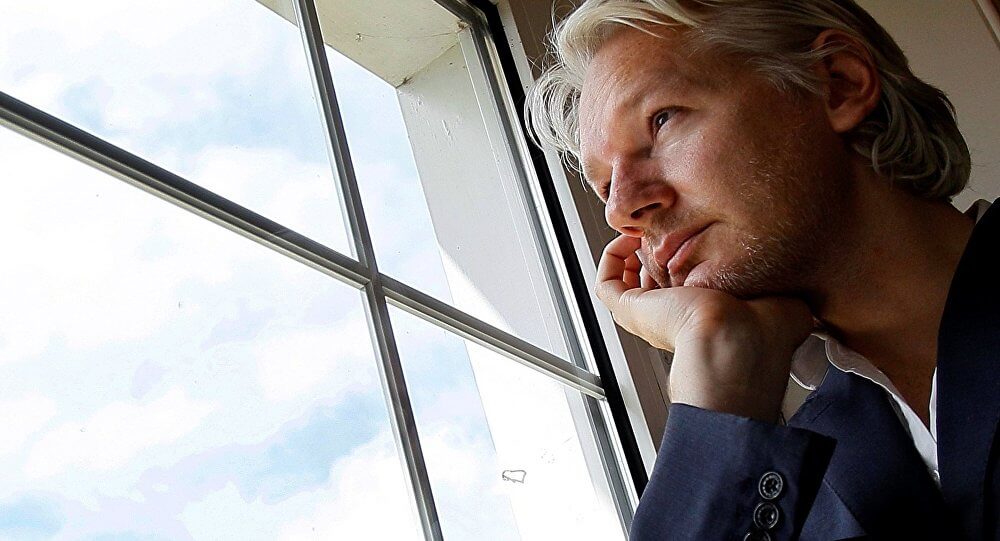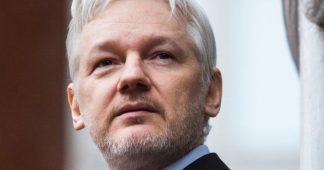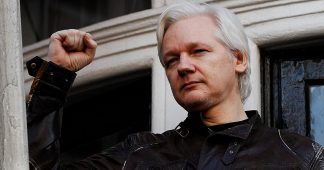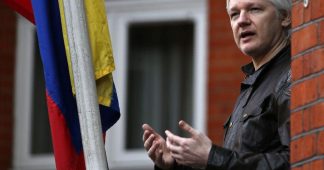By Cassandra Fairbanks
March 27, 2019
It was meant to be a routine visit by a journalist to another journalist. Instead, I found myself locked in a cold, surveilled room for over an hour by Ecuadorian officials, as a furious argument raged between the country’s ambassador and Julian Assange on Monday.
The room was inside the Ecuadorian Embassy in London, where 2019 Nobel Peace Prize nominee Julian Assange currently lives under the ostensible protection of political asylum. Yet the WikiLeaks publisher was barred from entering the room, where he was supposed to join me for a pre-approved meeting, because he refused to submit to a full-body search and continuous surveillance.
In the fireworks that followed, Assange accused the ambassador of being an agent of the United States government.
The crackdown on visitors was felt before I even entered the embassy. It’s the third time I’ve visited in the past year, and each time the atmosphere seems progressively worse.
Just like my previous visit, since new rules for visitors were enacted, I couldn’t take my phone into the meeting without giving the Ecuadorian officials a swathe of data. If you want to take it in with you, they request its brand, model, serial number, IMEI number, and telephone number. I was also advised that Ecuador could not be trusted to hold my phone while I met with Assange, so I left it behind and walked to the embassy phoneless, several minutes early to make sure I was on time.
When I arrived, embassy staff checked my passport and letter of approval and pointed at the time on the letter. I was six minutes early. Instead of allowing me to wait inside, they told me to come back at the appropriate time — despite knowing that I did not have a phone or watch on me.
When I visited for the first time, which I believe was a year ago to the day, the atmosphere was far more welcoming. The staff and ambassador that were there during my first visit have since been replaced.
After being searched, the staff directed me into the conference room, where two large visible cameras were pointed at the table. Those were there last time too. I knew the drill — or so I thought. They reminded me multiple times that my visit was only approved until 5 p.m. and that I would need to leave on the dot.
“Just doing my job,” the staff member told me.
A few moments later Assange walked by the door, but could not enter. Embassy staff demanded that he submit to a full-body scan with a metal detector before allowing him in the room. They have not done this with any other visitor in the nearly seven years that he has lived there, including during my previous visits.
“I don’t want to do the body scan. It is undignified and not appropriate,” I heard Assange say. “I am just trying to have a private meeting with a journalist.”
The door was slammed shut by someone from the embassy. I decided to sit and wait.
Not only would they not let Assange in to see me without a body-scan, they also forced his lawyer to be scanned before he could come in to update me on the situation.
After roughly 20 minutes, the lawyer came in and informed me that they were demanding to search Assange. Moreover, we would not be permitted to talk anywhere outside the highly-surveilled room where the Ecuadorians had confined me. Agreeing to these draconian terms would set a bad precedent — so he was unsure if the meeting would go ahead. After appraising me of the situation, he left the room.
A bit later, I decided to leave the room myself for an update from embassy staff. I quickly discovered that the door was locked from the outside. So I went to the second door — that was locked too. That was when I realized that Ecuadorian officials had deliberately imprisoned me in a room.
As this ominous realization dawned on me, I heard a dramatic confrontation unfolding outside.
“What are you frightened of in relation to me meeting with a journalist? What is the embassy afraid of?” Assange asks. I can’t hear the response.
Assange is arguing that as a political refugee the embassy has a duty to protect him — not to treat him as a prisoner.
“Is this a prison?” Assange asks.
“It’s not,” they reply. “You know it’s not.”
The visit to the publisher had, in fact, become eerily similar to visits I have made to inmates at federal penitentiaries in the US. It seemed our government was getting what they wanted from Ecuador, as a former senior State Department official told Buzzfeed in January, “as far as we’re concerned, he’s in jail.”
Assange, clearly agitated, demands to know “why are you surveilling me speaking to a US journalist? Do you think it’s unreasonable for me to expect privacy when I meet with a journalist? Why are you silent?”
The embassy staff member responded that he “can’t say anything.”
“Why can’t you say anything? Don’t you have an excuse? What is the basis? Why are you surveilling an American journalist? What reason should we tell her?” Assange asks.
The conversation becomes hard to hear, as I am still locked in the room.
Assange’s lawyer is also being searched again outside the room, though I can only hear bits and pieces of that conversation. He comes back in with a glass of water and tells me to hang tight. I feel like a prisoner receiving a visit. Finally, someone from the embassy comes in and tells me that I need to go to the lobby so that the ambassador could meet with Assange in the room. The room with the cameras and the bugs.
I see Assange in passing in the lobby and say hi, but it’s cut short as he is directed to the conference room.
Still phoneless, I glance at a clock and notice that it’s 4:19pm. I was locked in the room for over an hour.
Sitting in the lobby I hear much of the conversation, so I begin to take notes.
“Is this a prison? This is how you treat a prisoner, not a political refugee!” Assange demands.
Ambassador Jaime Alberto Marchán retorts, saying it’s “for our protection, and to protect you!”
At this point, clearly frustrated, Assange asserts: “I am trying to have a private conversation with a journalist. I am also a journalist — and you’re stopping me from doing my work. How can I safely relay my mistreatment and the illegality going on here to this journalist while under surveillance?”
One of the issues, it seemed, is that Assange wanted to bring a small radio into the conference room to muffle our voices, so the microphones surveilling the room wouldn’t pick up what we were saying as easily. There also appears to be concern that he will share stories with other journalists now that they have him muzzled and gagged.
“You are preventing this journalist from meeting with me in any other room,” Assange says, but only part of the conversation is audible at this point as someone cleaning decided they needed to jingle keys and make a ton of noise for several minutes.
“You have been illegally surveilling me,” Assange sternly insists.
“I want you to shut up,” the ambassador says.
“I know you want me to shut up — the Ecuadorian president has already gagged me,” Assange fired back. “I am banned from producing journalism.”
Assange isn’t wrong. On March 28, 2018, Ecuador caved to pressure from the United States government to isolate Assange by revoking his right to have visitors, make phone calls or use the internet. In order to have his visits and internet restored, he was presented with a nine-page document that outlined limitations and restrictions on what he would be able to do and say online.
Ecuadorian President Lenín Moreno publicly said that Assange is gagged from writing “political opinion” including about US and Spanish policies. This obviously destroyed his ability to work as a journalist and publisher. He told AP: “if Mr. Assange promises to stop emitting opinions on the politics of friendly nations like Spain or the United States then we have no problem with him going online.” He and the foreign minister have publicly repeated the statement many times, even going as far as to say that Assange cannot talk about his treatment in the embassy.
Ecuador's president Moreno directly admits to AP he has isolated @JulianAsange for the last six months to prevent him from writing his opinions about US and Spanish policies https://t.co/KEMKAjLjus @davidakaye pic.twitter.com/RLt4Sex1G7
— Defend Assange Campaign (@DefendAssange) September 27, 2018
In an interview with El Pais in July, President Moreno also said that his “ideal solution” is that Assange may “enjoy” being “extradited,” if the UK promises that the US will not kill him.
The argument continued to escalate. Assange brought up the fact that Ecuador allowed people with diplomatic immunity to be questioned by the US government in January. It is, of course, highly unusual for a sovereign nation to permit foreign officials to question its diplomatic personnel over diplomatic work, the confidentiality of which is protected by international law.
“You are acting as an agent of the United States government and preventing me from speaking with a US journalist about these violations,” Assange demanded. “What kind of sovereign state allows its ambassadors to be interrogated by another nation? No self respecting state does that!”
“You have been working with the US government against me, it’s disgraceful! You are an agent of the US government, and there will be consequences for your illegal acts,” Assange continues.
He points out that the ambassador has put his own privacy at risk with his efforts to assist their spying on him. (For many years, there had been a white noise machine in the conference room, to protect the ambassador and other officials during sensitive conversations — it has now been removed).
“The embassy’s own equipment that was used to protect you was removed to help them [the U.S. government] spy on me.”
Ironically, if they still had that equipment in place I would not have overheard everything to be able to write this very article.
As the conversation intensified, the staff member who had answered the door and searched me noticed that I was taking notes and turned on a loud television. He kept turning the volume up until the conversation in the conference room was completely drowned out. He also turned on a loud fan, despite the fact that the embassy was very cold.
At around 4:45pm, Marchán and several other men stormed out of the conference room. I attempted to ask the ambassador if the Embassy’s behavior was specific to me, or if they planned to give all visitors the same sinister treatment. He ignored me and rushed into another room.
Finally, Assange comes out and I am able to give him a hug and speak to him briefly in the lobby. Unfortunately, there was only about eight minutes left of our two-hour scheduled visit time and the limit was still being enforced.
At 4:58, a member of the staff came over and informed us that if we want to talk, it must be done in the conference room and that we only have two minutes left. We stared at him blankly then began to say our goodbyes.
My departure was so rushed that I ended up leaving my passport in the embassy, but thankfully the staff ran out and gave it to me.
You can read more about the Stasi-style surveillance at the embassy in my article about our visit in January. More up-to-date background information about what is currently going on with WikiLeaks and Assange can be found here and here.
UPDATE: WikiLeaks has confirmed this story.
We have approached Julian Assange's legal team to confirm this story. They have confirmed each factual element. The most up to date general context is here: https://t.co/z5JQhPqivVhttps://t.co/6o55ftm6iI
— WikiLeaks (@wikileaks) March 26, 2019
Published at http://www.informationclearinghouse.info/51337.htm











